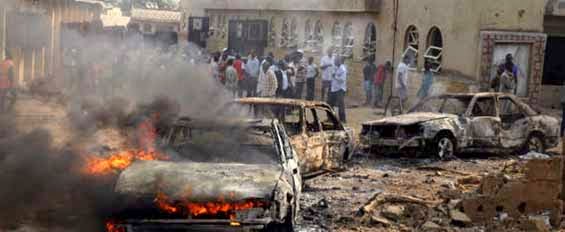In an article recently published in NewAgeIslam.com, the author Shadi Hamid has mentioned the heartbreaking admission of Sayed Kashua the most prominent Arab-Israeli author writing in Hebrew. Punctured with staccato prose, his column on leaving Jerusalem, perhaps forever, was a beautifully written, heartbreaking admission of defeat. For him, the notion that Arabs and Jews could live together had been shattered. “All those who told me there is a difference between blood and blood, between one person and another person, were right,” Kashua concluded. Here are excerpts from this article:
 |
| Illustration by Amos Biderman |
We might not like to admit it, but violence can, and often does, “work” in today’s Middle East. This is not just a reference to the Islamic State of Iraq and Syria (ISIS), but also to less extreme militant groups that control territory throughout Syria, providing security and social services to local populations. From Libya to Palestine to parts of the Egyptian Sinai, armed—and increasingly hard-line—Islamist groups are making significant inroads. This is the Arab world’s Salafi-Jihadi moment. It may not last, but its impact is already impossible to dismiss, to say nothing of the long-term consequences. In Libya and Syria, even non-Salafi groups like the Brotherhood are adapting to the new world of anti-politics, allying with local armed groups or working to form their own militias.
Bill Clinton, in his speech to the Veterans of Foreign Wars, on the “inevitability” argument: “People say, okay, maybe it’s not inevitable, but look, there are a lot of ethnic problems in the world. … And you’ve got all these ethnic problems everywhere, and religious problems. That’s what the Middle East is about. You’ve got Northern Ireland. You’ve got the horrible, horrible genocide in Rwanda. You’ve got the war, now, between Eritrea and Ethiopia. They say, ‘Oh, we’ve got all these problems, and, therefore, why do you care about this?’”
There was a difference between realism - recognizing that religious and ethnic hatreds are real and resonant - and resignation, where the powerful say nothing can be done and look away.
The two most destructive conflicts in the Middle East today are in Syria and Iraq, two countries that have imploded not because of too much intervention, but because of too little. In Syria, our failure to intervene with air support to help rebels hold territory and targeted military strikes to diminish the regime’s ability to kill not only exacerbated the humanitarian toll, but also undermined “moderates” - who have begged endlessly for the most basic weaponry - and strengthened extremist groups like ISIS. The claim, oft-repeated by opponents of intervention, that “there is no military solution” is a straw man, setting up a false dichotomy between military action and successful diplomacy, when the two, in fact, go hand in hand. Assad has no real incentive to negotiate in good faith in the absence of a credible threat of military force.









